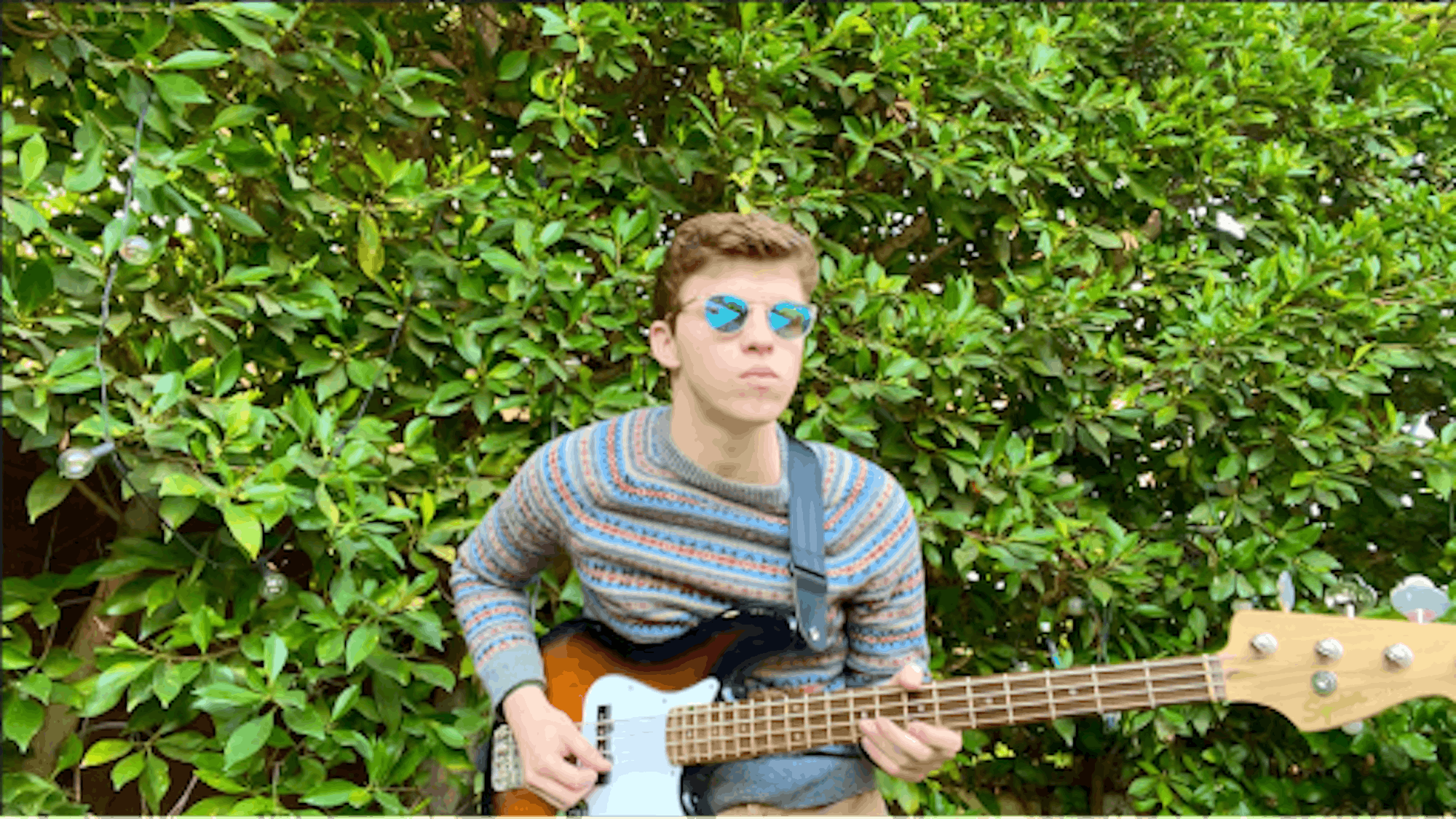After almost a year of experimentation, Stavros Hughes ’23 recently released a full-length debut album titled “Entropia,” a portmanteau of entropy and utopia. His album tackles the chaos of adolescence as well as themes of mental health and anti-establishment protest.
“I wouldn’t say I have much of a formal music background,” said Hughes. “I played violin from second grade, since my mom and sister were cellists, but in hindsight I should have chosen trumpet. I was in my high school orchestra but never liked it very much, only stayed because it would look good on a college [application].”
To Hughes, being a musician felt like a choice between being a major commercial pop music act or being a classically trained musician. It was only when Hughes took up music outside of the classroom that it became something of his own.
“It was the Strokes and Vampire Weekend that got me into playing guitar again” said Hughes. “I started learning some of their songs on guitar and would play them at kickbacks. One of the first songs I learned that really stuck with me was ‘These Days’ by Nico, with a really cool fingerstyle guitar riff.”
After teaching himself guitar, Hughes started experimenting by writing his own riffs, one of which would become the opening sound to “Blue Whale” on Entropia. He started composing basic progressions and riffs using the app Garageband with his iPhone as a mic and an un-amped electric guitar.
“Looking back, those demos were not good,” said Hughes. “The ideas were decent, but the execution was sloppy. I didn’t know much about mixing, so it was just parts laying on top of each other.”
During winter 2020, Hughes briefly formed a band with a few other members of the Class of 2023 in his dorm, and they would jam out in the Hop rehearsal rooms. However, once school moved remote, the band went on an indefinite hiatus.
“I gave up on collaboration because it wasn’t working with the era of COVID” said Hughes. “So I started practicing on my own and got a drum set. I had a really cheap CASIO synth and no speaker, but invested into a $50 mic. At that point, I didn’t know anything about music equalization. I had crappy headphones with no low end, so my first songs didn’t have any kick or bass.”
Despite his lack of technical knowledge, Hughes decided to post his music to major streaming platforms using Distrokid, a low-cost independent music distributor, and garnered a small following.
One of Stavros’ first fans was Tulio Huggins ’23, who reached out to him during freshman spring to compliment him on his debut single “The Mariner.” The two did not meet in person until sophomore winter.
“I put his first song ‘The Mariner’ into my playlist for laying down on the ground,” said Huggins. “It felt like a comfort song, it’s the kind of song that makes you at peace for self-reflection.”
Hughes spent much of the fall of 2020 writing songs for his album, but it took longer mixing and recording before he was happy with the finished product. He finished recording “Blue Whale” in his dorm during his sophomore summer. Hughes said he did not have a strict songwriting process, but he would always start with the instrumental and let that guide the lyrics.
Hughes says “Entropia” was largely inspired by the debut records from bands like the Strokes, MGMT, Arctic Monkeys and others. He developed his mixing style by imitation rather than formal education.
“Surprisingly, I wasn’t thinking of ‘A-Punk’ when I was writing ‘Backwards’ though,” said Hughes, noting that listeners have compared his song to Vampire Weekend’s.
Hughes’ music raises the question of whether mixing is an artistic or technical craft. Balanced mixing can dramatically improve the clarity and emotional impact of a piece — Hughes likens it to the unappreciated glue of music. But the number one rule of mixing is “to make it sound good,” Hughes said, which undoubtedly depends on the ears of the beholder.
Hughes notes that he instinctively mixed his vocals beneath the instrumentals in many of his earlier pieces — perhaps due to artistic style or a lack of self-confidence —but he has come to recognize the importance of louder and clearer vocals.
“I was worried that all the songs on ‘Entropia’ sounded too different,” says Hughes. “But once the album came out and I listened through all of it again, it finally made sense.”
Hughes' music explores a broad variety of themes, from satirical anthems to imagined cult life. The content of some of the songs and the cover art for the album point to Hughes’ introspection on his past.
“Some songs have always been more personal to me, like ‘Marigolds’ which is about my experience with OCD and anxiety,” said Hughes. “I chose a picture of me as a kid receiving the ‘Lord of the Rings’ trilogy for my birthday for the album cover to emphasize that significance. I cut out my eyes to make it more punk and edgier, even if there was no particular meaning to it.”
Hughes hopes to continue writing music and strives to make his next album more polished, thematic and continuous. He doesn’t plan on taking any formal vocal training as his untrained singing is part of his raw style, but he does hope to learn to not strain his voice. He also hopes to collaborate with Robin Martinez ’23 to play some covers and original songs live.
“We’re trying to put together a band for some concerts and play some covers and original songs,” said Martinez. “I had a lot of fun performing over this summer, and I am excited to perform with Stavros and would love to see what he’s like on stage.”
Huggins is also excited to see Hughes play his music to a larger audience. He personally hopes Hughes starts to use TikTok as a tool to connect with more people.
“I’ve toyed with a bunch of ideas for my next project,” said Hughes. “I’ve considered going in a more mature, serious and moody direction, as well as considering a bright, dancy direction since I’ve been listening to ABBA and Interpol. I haven’t made up my mind but I’m going to take my time.”
Correction appended (6:30 p.m., Jan. 18, 2022): A previous version of this article misquoted Hughes comparing one of his songs to “A-Punk” by Vampire Weekend. The song’s title is “Backwards,” not ”Sideways.” The article has been corrected.




